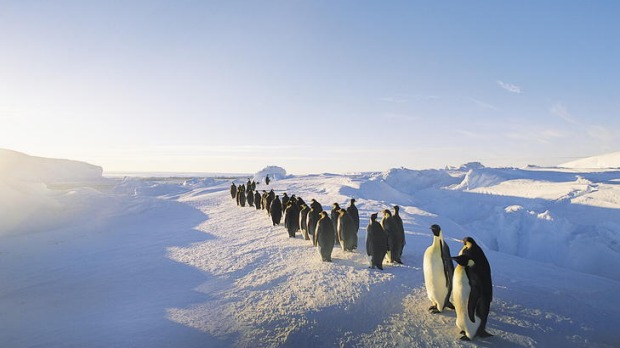
The first ring was shocking when it came. After 10 days you forget that things such as mobile phones even exist, so to hear one trilling away in someone's pocket seemed so out of place, like hearing a bird singing in a high-rise office.
We all turned to the culprit, who seemed as surprised by his vibrating trousers as anyone. "Sorry," he said, ducking his head before moving off to another deck to answer the call.
It had been 10 days with no mobile phones. Ten days with no emails, no internet, no TV, no news of the outside world whatsoever.
Anything could have happened. There could have been natural disasters, celebrity deaths, declarations of war, MasterChef evictions . . . Barack Obama could have married Cher and we'd all have been none the wiser.
It happens, too. I was travelling through western Kenya when the Boxing Day tsunami hit in 2004 and didn't find out about it for another week when I finally got to an internet cafe in Nakuru. I was in the US when the Thredbo landslide happened and an event such as that is barely a blip on the radar of American consciousness. I found out days later through family.
It's a strange feeling being cut off because we're all addicted to information, even if we don't always notice it.
In the Western world we have a constant connection to the information superhighway – just that phone in your pocket binds you permanently to the world, locking you in its invisible grip (while also keeping you up-to-date with the latest thing Charlie Sheen has posted on Twitter).
Some people travel with the express intention of breaking free of that grip and I'd found the perfect place to do it: Antarctica.
There's no choice there. In this world of free Wi-Fi, data roaming and travel SIM cards, it usually takes a major act of will to separate yourself from the rest of the planet – but not on an Antarctic cruise. There's no mobile phone signal in the southern continent. There's no internet connection, either.
There's a satellite email system on board most ships but it's slow, expensive and after a few days, just unnecessary.
"Would you like us to set up an email address for you?" the maitre d' had asked, looking up from his clipboard as I walked onto the ship in southern Argentina.
It only took a few seconds of thought. "No, thanks." Ten days of complete separation – why is that such an attractive proposition?
It was unnerving at first, as we headed out through the Beagle Channel, watching the bars on my phone slowly melting away like an iceberg that had drifted too far north. Four bars, three bars, two bars, one bar . . . Nothing. Silence.
And so it would remain for the next 10 days.
Fortunately, it didn't take long to kick my information addiction. In fact, I didn't even notice it happening. For the first few days there's the distraction of your surroundings – the ship rolling through the Drake Passage, the fellow passengers from all over the world, the thought of icebergs and penguin colonies over the horizon.
Then you're there, in the stark wilderness. The silence, once you're out of earshot of the ship's generators, is incredible.
The blinding white expanse of snow and ice is matched by the equally jarring sound of nothing at all.
The ring of a mobile phone would be the worst sound in the world, like a leaf-blower at seven in the morning (a pet hate – thank you, maintenance men of the world).
It's actually a relief not to have anything to "check". No point checking your phone, because it doesn't work – although you almost feel like checking to make sure it still doesn't work.
There's the knowledge that emails packed full of hilarious photos of cats will be piling up in your inbox but there's nothing you can do about that, either.
By day five or six, however, even those little niggling feelings in the back of your mind have disappeared. Your focus switches solely to the things around you: the scenery there to be taken in, the people there to be talked to.
Is this how travel was meant to be? After all, the only way to truly get away from it all is to cut yourself off from it all. It's amazing how unimportant the petty gripes of the real world become when you no longer have to hear about them.
But then, inevitably, there's the return to civilisation as we find ourselves chugging through the Beagle Channel once more, re-entering Argentinean territory. That's when the shrill ring of a phone disrupts the morning air and it becomes clear that the modern world has a way of catching up with you eventually.